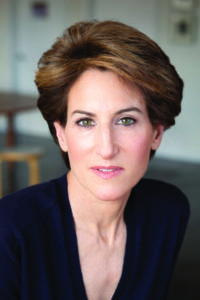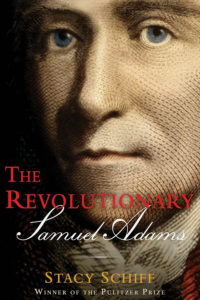In their affectionate geriatric correspondence, old political rivals Thomas Jefferson and John Adams agreed that it was “difficult to say at what moment the revolution began.” Was it in 1765, when rioters in Boston greeted and ultimately defeated Parliament’s Stamp Act? Was it 1768, when vandalism and intimidation by the Sons of Liberty prevented colonial officials from enforcing the Townshend Duties? Or 1770, when two cornered, taunted, and assaulted British soldiers fired into a bludgeon-wielding crowd in what was given the propaganda epithet “Boston Massacre”? Was it 1773, when, before a cheering audience of thousands, a cadre of costumed, face-painted men dumped 342 chests of East India Company tea into Boston Harbor? Or 1775, when colonial guerrillas ambushed British regulars in Lexington and Concord?

While the revolution’s precise origin may remain in doubt, Pulitzer Prize-winning biographer Stacy Schiff argues that its originator should not. All of these candidates for revolutionary primacy owe their incitement, organization, or public representation to one man: Samuel Adams, whom Schiff calls “the only downwardly mobile [founding father],” and “the sole signer of the Declaration of Independence to come down to us as an incendiary and a beer.”
The stark, declarative title of Schiff’s illuminating book, The Revolutionary, points to one reason why Adams’s massive fame and influence prior to independence quickly diminished once nationhood had been achieved. His genius was “better suited to rebellion than statesmanship,” to lobbing grenades at power than exercising it. Another reason why Adams has been eclipsed in public memory by less influential founders is that the heroic and “sanitized” version of the nation’s birth cannot easily accommodate the critical role of one of America’s first and finest rabble-rouser, character assassin, political extortionist, and master of “the misinformation business.”
The son of a fourth-generation Massachusetts malster (a man who steeped, dried, and kilned barley to be fermented into beer), Adams rejected careers in the ministry, law, and commerce before inheriting his father’s declining malt business and hastening its demise. Until age 42, he had distinguished himself only as a shrewd and avid conversationalist about all things political. But over the next 12 years — from 1764 to 1776 — his skill at “muscl[ing] words into deeds” would lead one early biographer to call him “without question the greatest person ever born in Massachusetts.” Thomas Hutchinson, New England’s “most prominent and popular citizen” at the moment Adams’s star began to rise — and the man whose influence, reputation, and health Adams was largely responsible for destroying — assessed his nemesis differently. “I doubt whether there is a greater incendiary in the King’s dominions or a man of greater malignity of heart,” wrote Hutchinson in 1772, “or who less scruples any measures, ever so criminal, to accomplish his purposes.”
How did Adams achieve such pinnacles of both honor and infamy? Mainly, Schiff argues, by his deft and ruthless deployment of “a single weapon: the word ‘liberty.’ ” As English citizens rather than imperial subjects, Adams insisted, American colonists possessed the liberty of self-governance and, particularly, the right to ratify or reject in colonial legislatures their modes of taxation. The royal governor (or customs official, or importer of boycotted English commodities) who infringed on this liberty should expect all manner of righteous popular resistance: windows shattered, homes smeared with dung, expulsion from taverns and clubs, mockery in the streets, demonization in print, threats of bodily harm. As America’s most prolific propagandist and “tabloid journalist,” Adams both fomented such sanctions against liberty’s enemies and justified them after the fact. As Schiff writes, “He repackaged vandalism as idealism, extracting principled pronouncements from street theater … [and] stopped at nothing, including the truth.”
Schiff dubs her subject “the Machiavelli of chaos” — a sobriquet whose aptness is illustrated by Adams’s “stage management” of both the run-up to the 1770 Boston Massacre and its aftermath. Having helped make British law unenforceable and British taxes uncollectible in Massachusetts, Adams spearheaded the vilification of the troops that the King finally sent to restore order in the colony, falsely or exaggeratedly accusing them of all manner of offenses against a peace-loving people.

When a few panicked soldiers finally fired into the mob that was pelting them with rocks, ice, and metal projectiles, killing five rioters, Adams labeled the incident a “massacre.” Then he arranged for the worst trial attorney in Boston to prosecute the offending troops and one of the best (his cousin John Adams) to defend them. When a New England jury acquitted the troops of murder, Samuel Adams wrote to Parliament under his own name, trumpeting the verdict as proof of colonial moderation and respect for due process. Simultaneously, in multiple newspapers and under several of his more than 30 pseudonyms, he published article after article that accused the British of wantonly slaughtering innocents and decried the not-guilty verdict as an appalling travesty of justice.
Working behind the scenes and writing under pseudonyms, Adams was able to thwart multiple attempts by Lt. Governor Hutchinson and other officials to charge him with treason. “With his closet of disguises,” Schiff writes, “Adams seemed to lurk around every corner.” Everyone knew he was rebellion’s puppet master, but his enemies couldn’t prove it — and his allies weren’t talking. These pseudonyms and disguises also highlight a feature of Schiff’s book that might frustrate some readers: the personal Samuel Adams, his inner life and intimate relationships, emerge from this biography largely unaddressed and unknown. Here is a man, it appears, whose entire existence was subsumed in his role as the revolutionary.
Schiff’s account of Adams’s life suggests two other bold takeaways. It reminds us, uncomfortably, that one man’s freedom fighter has always been another man’s terrorist. And it presents us with a model of the revolutionary as a figure motivated less by the goal of political change (Adams himself denied that he ever sought or imagined American independence prior to 1774) than — like a jazz musician — by the sheer energizing joy and improvisatory artistry of his craft.



